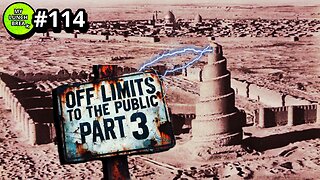Premium Only Content

Episode 2258: St Prosper of Aquitain (Reggio)
St. Prosper of Aquitaine was born around 390 AD in the Roman province of Aquitaine, in what is now southwestern France. Little is known about his early life, education, or family background. Prosper was a layman, which was somewhat uncommon for prominent theological figures of his time.
Contributions to Theology and Literature
Prosper is best known as a Christian writer and disciple of St. Augustine of Hippo. His works are crucial for understanding the theological debates of the 5th century, particularly those involving grace and predestination.
Key Works:
"De vocatione omnium gentium" (The Call of All Nations): This work defends the universality of grace and emphasizes that salvation is offered to all, aligning closely with Augustine's teachings on grace.
"Epitoma Chronicon": A continuation of Jerome's chronicle, providing historical details and commentary on events up to his time.
"Liber Sententiarum": A compilation of sentences or statements on various theological issues.
Poetry: Prosper also wrote several poems, including "Epigrammata" which are often theological in nature, reflecting on the nature of Christian doctrine.
Role in the Semi-Pelagian Controversy
Prosper was a staunch supporter of Augustine's teachings against Pelagianism and Semi-Pelagianism. Pelagianism, a doctrine proposed by Pelagius, denied original sin and the necessity of grace for salvation. Semi-Pelagianism, a moderated form of Pelagianism, acknowledged the necessity of grace but claimed that the initial steps towards faith were made by human effort.
Prosper wrote numerous letters and treatises to defend Augustine’s views and to argue against Semi-Pelagianism, particularly against the monks of southern Gaul who were prominent proponents of this doctrine. His fervent defense helped to influence the eventual condemnation of Semi-Pelagianism by the Second Council of Orange in 529 AD.
Later Life and Influence
In his later years, Prosper moved to Rome, where he continued his theological work and became a secretary to Pope Leo I. His association with the Pope gave him significant influence in ecclesiastical matters.
Prosper's works were instrumental in shaping the theological landscape of his time, especially in the Western Church. His writings contributed to the development of doctrines concerning grace, free will, and predestination.
Death and Legacy
St. Prosper of Aquitaine died around 455 AD. He is remembered as a significant theologian and writer who played a key role in the theological controversies of the early Church. The Catholic Church commemorates him on June 25.
Prosper's legacy lives on through his extensive writings, which continue to be studied by theologians and scholars interested in early Christian theology and the development of Western Christian doctrine.
-
 1:50:38
1:50:38
Mally_Mouse
8 hours agoSaturday Shenanigans!! - Let's Play: Mario Party Jamboree
44.6K -
 1:13:00
1:13:00
Patriots With Grit
12 hours agoWill Americans Rise Up? | Jeff Calhoun
36.4K13 -
 14:55
14:55
Exploring With Nug
12 hours ago $10.67 earnedWe Found Semi Truck Containers While Searching for Missing Man!
53.8K7 -
 27:57
27:57
MYLUNCHBREAK CHANNEL PAGE
20 hours agoOff Limits to the Public - Pt 3
117K62 -
 38:07
38:07
Michael Franzese
13 hours agoLeaving Organized Crime and Uncovering Mob in Politics: Tudor Dixon and Michael Franzese
97K15 -
 2:42:54
2:42:54
Jewels Jones Live ®
2 days agoAMERICA IS BACK | A Political Rendezvous - Ep. 111
76.9K48 -
 8:47:33
8:47:33
Due Dissidence
1 day agoLIVE: Workers Strike Back Conference ft. Chris Hedges, Jill Stein, Kshama Sawant, and More!
116K58 -
 8:36:37
8:36:37
Right Side Broadcasting Network
5 days agoLIVE REPLAY: CPAC 2025 Day Three with President Donald J. Trump - 2/22/25
459K101 -
 1:05:34
1:05:34
The Big Mig™
21 hours agoConfirmed Kash Patel New FBI Director, Bring On The Pain |EP483
110K31 -
 53:59
53:59
Tactical Advisor
16 hours agoThe Vault Room Podcast 009 | Everyone Getting $5000?!
86.8K12